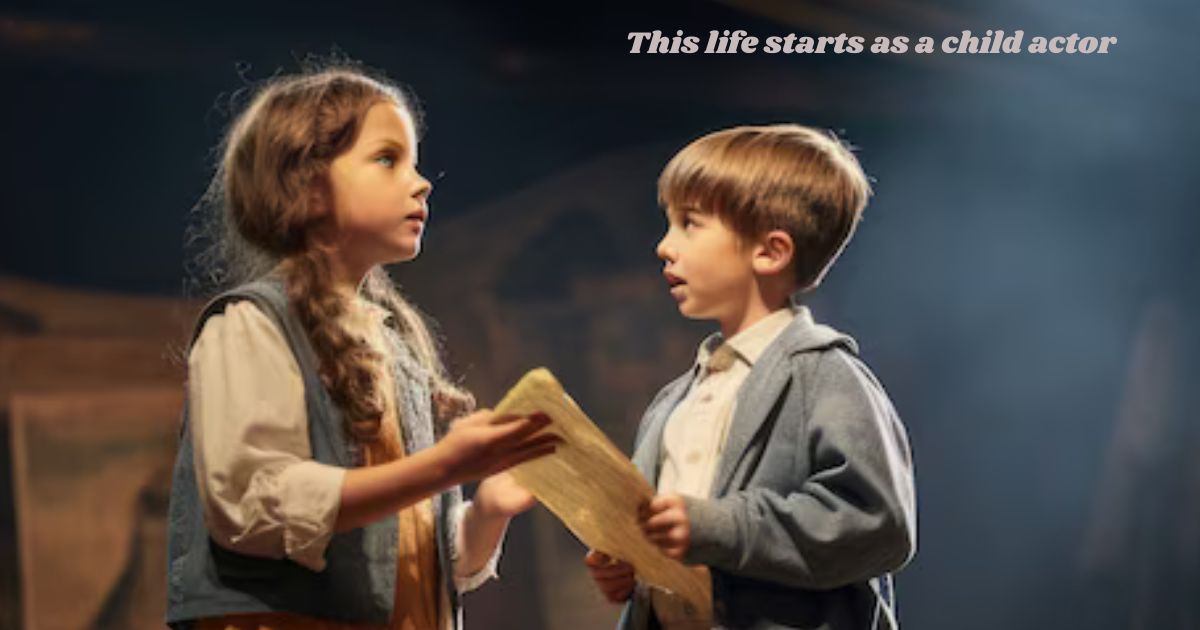The phrase “This life starts as a child actor” captures the unique and often challenging journey that child actors embark on as they navigate the world of fame, professional work, and personal growth. Many of today’s most successful actors and performers began their careers as children, but the transition from child star to a well-rounded adult actor isn’t always easy. This article explores the various aspects of a child actor’s life—how it begins, the challenges involved, and how some manage to turn early success into lasting careers.
Early Beginnings: The Spark of Talent
For many child actors, the road to acting often begins with an early discovery of talent. Parents, agents, or even casting directors might notice that a child has an exceptional ability to express emotion, remember lines, or take direction. It could be through school plays, local theater, or family encouragement that the child first steps into the world of acting.
However, entering the industry as This life starts as a child actor is not just about natural talent. Training, discipline, and the ability to work under sometimes stressful and demanding conditions are essential. These young actors often attend acting classes, voice training, and other workshops to enhance their abilities, all while balancing school and personal development.
The Child Actor Experience
Early Exposure to Professionalism
Working as a child actor allows individuals to experience professional environments from a young age. They learn discipline, time management, and how to interact with other professionals. These skills are often transferable and beneficial throughout life.
Financial Opportunities
One of the most tangible benefits of starting an acting career as a child is the financial reward. Successful child actors can earn substantial sums of money, which, when managed properly, can serve as a financial cushion for the future.
A Head Start in the Industry
Child actors often have a unique advantage over their adult counterparts in terms of industry experience. By the time they are in their twenties or thirties, many of them will have already accumulated years of acting credits and honed their craft, making them appealing to casting directors.
High Expectations and Pressure
With success comes pressure. Child actors are often expected to perform at high levels, maintain professional attitudes, and balance their personal lives with a demanding career. This can lead to stress and burnout at a young age.
Loss of Normal Childhood Experiences
While other children are going to school and participating in regular activities like sports, child actors may spend most of their time on set or in auditions. This can limit their ability to have a “normal” childhood, sometimes causing feelings of isolation or loneliness.
Navigating Challenges: A Child Actor’s Path to Adulthood
Education and Balance
One of the key factors in ensuring a smooth transition from child star to adult actor is education. Many child actors struggle to balance schoolwork and acting, but those who manage to maintain a strong academic foundation often have more opportunities when acting roles dry up. Tutors, on-set schooling, and flexible educational options can help child actors keep up with their studies.
Parental Guidance and Support
Parental involvement can make or break a child actor’s career. Parents need to ensure their children’s emotional and mental well-being while navigating the industry. This includes setting boundaries, advocating for fair work conditions, and helping children maintain a sense of normalcy outside of their career.
Seeking Professional Help
Mental health is a significant concern for many child actors. The pressures of fame, criticism, and long work hours can take a toll on their emotional well-being. Many successful actors seek help from therapists, life coaches, or other mental health professionals to help them navigate the complexities of life in the spotlight.
Choosing the Right Roles
Selecting roles that allow child actors to grow and showcase their evolving talent is crucial. As child actors mature, they must choose projects that allow them to transition into more adult-oriented roles. This often means turning down work that may typecast them or keep them in the same roles they played as children.
Successful Transitions: Examples of Child Actors Who Made It Big
Natalie Portman
Natalie Portman started her acting career at the age of 12 in the critically acclaimed film Léon: The Professional (1994). She successfully transitioned from child actor to adult star, balancing her acting career with academics. Portman attended Harvard University and went on to win an Academy Award for Black Swan in 2010.
Leonardo DiCaprio
Leonardo DiCaprio began his acting career as a child on television shows such as Growing Pains before becoming one of the most successful actors in Hollywood. DiCaprio has won numerous awards, including an Academy Award for his role in The Revenant (2015), and is known for his wide range of roles in major films.
Drew Barrymore
Drew Barrymore comes from a family of actors and was thrust into the limelight at a very young age with her role in E.T. the Extra-Terrestrial (1982). Despite facing personal challenges, Barrymore reinvented herself and is now an accomplished actress, producer, and talk show host.
Conclusion
“This life starts as a child actor” is a journey filled with both opportunities and challenges. For those who manage to balance their careers with personal growth and education, child acting can serve as a foundation for lifelong success. However, it is vital for child actors to have strong support systems in place to navigate the complexities of early fame and prepare for the next chapters of their lives.
FAQs About ‘This life starts as a child actor’
What are the legal requirements for child actors?
Laws vary by location, but most places have strict regulations concerning child labor, ensuring that child actors are not overworked.
Do all child actors become famous?
Not all child actors achieve fame. While some may land significant roles, others may only appear in smaller productions.
How can parents support a child actor’s career?
Parents can support their child’s acting career by ensuring they have the emotional support and balance needed to manage both school and work.
Is acting a good career for children?
Acting can be a rewarding career for children, but it comes with its own set of challenges. The industry can be tough, and not all children thrive under its pressures.
How much do child actors get paid?
The pay for child actors varies widely depending on the project and the actor’s experience. Some child actors earn substantial sums for leading roles in major productions, while others may make more modest amounts for smaller parts.
Can child actors work full-time?
Most jurisdictions have limits on how many hours child actors can work, and these limits are often based on the child’s age.











One thought on ““This Life Starts as a Child Actor: The Path from Early Fame to Adult Success””